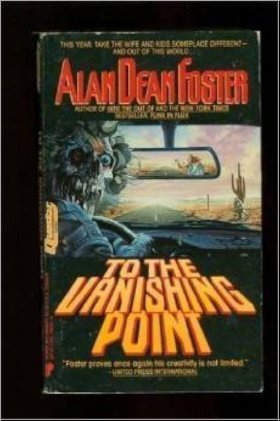Maybe a cheeseburger and fries would serve as a temporary substitute, her father mused. “Just let me check us in first.” He headed for the door. “Maybe the manager can recommend a place to us.”
They must have presented an interesting sight as they crowded into the modest waiting room. There was a stone fireplace, cold this time of year; a smaller color TV on a stand, on which a young man with too many teeth was giving away large appliances; a pile of magazines; a couple of couches for the use of guests only; and the counter with the omnipresent revolving postcard rack and boxful of local giveaway pamphlets advertising attractions in Salt Lake City, Las Vegas, and points in between.
The manager/owner was in his early sixties, a large man with a tired paunch and a flowing white mustache. Thin white rimless glasses framed his eyes, and suspenders struggled to keep his waistband even with the bottom of a striped white shirt. He grinned as he inspected his visitors.
“Well! You folks look like you’ve been through the wringer!”
“We do?” Frank didn’t realize it showed that much. “Just been driving a long time.”
The manager grunted. “That’s tough on anybody. Y’all stayin’ here?”
“No. Just the four of us. Our friends will be looking for separate transportation out of town.”
The man shoved a registration form across the narrow counter. “Greyhound stops once in the morning, Trailways in the evening—they been kind of irregular lately.”
Alicia tried to make conversation while her husband filled out the registration form. “Pretty country.”
“That’s why folks’re livin’ here.” The manager chuckled. “Quiet. You want excitement, you’re in the wrong town. Wrong state, far as that goes.”
A woman juggling a glass and dishrag against each other appeared by the back door. “Hello, folks.”
Alicia smiled. “Good evening.”
“Yes, it is a good evening, isn’t it?” She frowned slightly at the glass, worked the rag a little faster. “Where you folks from?”
“Los Angeles,” Steven piped up.
“Oh?” She left the doorway to peer over the counter. “Didn’t see you down there, sonny.”
“We’re on vacation,” Steven told her brightly, “and you should’a seen some of the things we’ve seen!”
His mother glanced sternly down at him. “That will be enough, Steven.”
“Awww.” Disappointed, he turned to stare at the TV.
Frank turned the completed registration form around. “Want a credit card imprint now?”
“Neh. Don’t need it—unless you want to charge long distance calls. Local are free.”
“All we want now is something to eat.”
Taking his cue, the manager leaned forward and looked to his left, toward the street. “You go up Central about two blocks and you’ll hit downtown. ‘Bout half a dozen good places to eat.”
“Which one would you recommend?” Alicia asked politely.
“Oh, none of ’em. They all pretty much stink. Dave’s Diner’s a real tourist trap and Judy’s Country Kitchen’s anything but.”
“That’s right,” said his wife cheerfully. “They all suck.”
“I see.” Alicia regarded the pair of homey smiles askance. Frank stepped in.
“Then where would you suggest we eat?”
“There’s another hotel up the street. The Gables. Rooms are awful; full of roaches.” The woman made a face. “And sometimes they don’t wash their linen between guests, but the kitchen is run separate. My husband and I go there ourselves sometimes when we want to eat out.”
“That’s very straight of you. Thanks.”
“Don’t mention it,” said the manager. “Glad to help.”
They went back to the motor home and began gathering clothes and toiletries for their room. “That’s the kind of honesty you don’t find anymore,” Frank was murmuring.
Alicia was less sanguine. “I wonder. It was more than just honesty. They were so open, it was like they couldn’t lie if they wanted to.”
Frank grabbed a pair of clean socks. “Maybe it would’ve been different if they had a coffee shop of their own.”
“Wouldn’t it be neat if everybody was like that?” said Wendy.
“Bad for business.” Frank looked toward the back of the motor home. “Burnfingers, Mouse: dinner’s on us.”
“I can pay,” Begay told him. “I have gold.”
“Which you need for your jewelry work,” Frank reminded him. “Our treat, and I don’t want to hear any more about it.”
They walked, since it was only a few blocks to the hotel’s restaurant. A few locals were out enjoying the evening sunshine. They chatted easily among themselves, occasionally waving to the cluster of tourists.
It was early for supper and they had the restaurant largely to themselves. Frank found it hard to relate to a dinner menu after hours of fleeing through permanent night. In jumping threads, they’d lost most of a day. Reality lag instead of jet lag, he told himself.
The place wasn’t fancy, but it was clean. Flower-print tablecloths covered each dining area. The waitress was young and attractive.

























